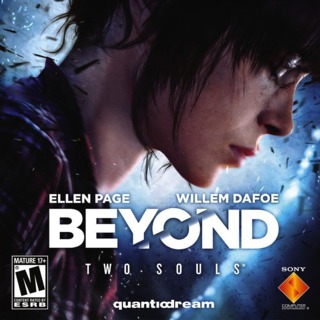As I progressed through Beyond: Two Souls, I couldn't help but remember an article I read a few years ago written by Roger Ebert where he resolutely stated, "...no video gamer now living will survive long enough to experience the medium as an art form." I don't mean to speak ill of the dead, but it was a pretentious article written by a now-dead fossil who very clearly had zero interest in video games. Regardless, he still felt the need to express his disdain for those attempting to present/evolve the industry as a medium for artistic expression, and this contempt is unfortunately echoed by probably the majority of people today. I can't tell you how pleased I am with how absolutely Beyond: Two Souls proves them all wrong.
This game moved me. I've never experienced anything on PC or consoles that evoked the spectrum of emotions 'Beyond' did. Nothing even comes close. The AAA graphics, the story, Ellen Page's brilliant acting, the musical score and the story were all put together in a way that no other game has ever managed, nor likely even attempted.
Having experienced (and enjoyed) Quantic Dream's Heavy Rain from 2010, I knew what to expect from 'Beyond' in terms of gameplay. I knew it wasn't going to be a frenetic button masher or an adventure game like Uncharted or Tomb Raider. Heavy Rain was, when you get down to it, merely a medium for interactive story-telling, and it did this pretty well. 'Beyond' follows along these lines, but does it far, far better.
Before even thinking about purchasing 'Beyond: Two Souls', you really need to know what it is and what it isn't, and you need to know what you're looking for from it. This is not a game you'll be 'challenged' by in the typical sense, where you're presented with entertaining obstacles and your enjoyment is derived largely by overcoming them. It never set out to do that or promised this sort of experience. Instead, 'Beyond' offers to fully immerse you in a story and its main character like no other game or movie before it could ever hope to accomplish.
A lot of comments and reviews that I've read for this game so far have focused on how little interaction is needed to progress through the game, and how trivial the interaction can seem. A good example would be a scene where a teenage Jodie (Page) is told she's moving and needs to pack up her essentials and leave her home immediately to join a CIA training school. You then control a crying Jodie as she collects the items she feels are essential, and this interaction is limited to little more than walking up to various objects and pressing a button to pick them up and put them in your bag (or discard them). This disappoints a lot of players, and they ask questions like, "Why bother with involving the player at all, if it's going to be so trivial? I feel like I'm just watching a movie."
Granted, pressing buttons to pick objects up isn't rewarding or particularly challenging, but that was never the point. The point was to allow you, the player, to immerse yourself into Jodie's character. As she walks around the room sobbing, you control her as she essentially relives her childhood. You can view (and keep if you choose) pictures she drew as a child, you can collect (or discard) photos with family/friends, you can throw a tantrum and destroy furniture and mirrors...or you can coldly collect your belongings and leave. Every player is going to experience this scene differently, and what could be regarded as a trivial episode for some ended up being an extremely powerful one for me. For me, Jodie was crestfallen, and she railed against being forced to move. She tore up old photos, shattered mirrors, cried and cursed and took her time doing it. Finally, she accepted her fate, packed up and headed for the door. As she went to open it, she noticed something lying on her bed. It was her stuffed bunny, and THAT was definitely essential for CIA training school.
Most of the game is not nearly as mundane. The main story of the game involves far more interesting stuff (Jodie ends up in CIA school because she's linked to an unexplained spirit-entity with all sorts of cool powers) and she has all kinds of fascinating/exciting/scary/funny/sad encounters, but each scene, each action and each choice you make along the way affects your experience with Jodie. Who she is, what she's doing and what she's feeling evolve not just on screen as you watch, but also with your choices and the way you control her experiences.
Beyond: Two Souls, I believe, is probably more movie than game, but it's so much more than a movie. Calling it a game/movie hybrid doesn't do it justice. It's not a game or a movie, but something altogether different. Having just finished it tonight, I feel l just lived through someone else's dreams or memories. I've never felt so in a character or story before, and I still have butterflies thinking about it. Someone more eloquent than me will probably come up with a better definition for what I just experienced. All I know is that I loved it.
We need to see more from Quantic Dream.

